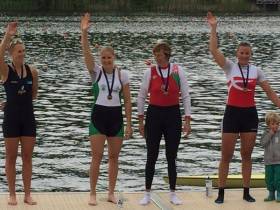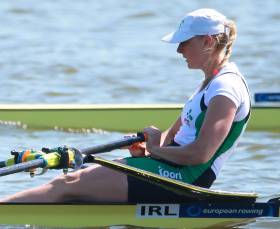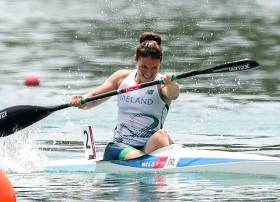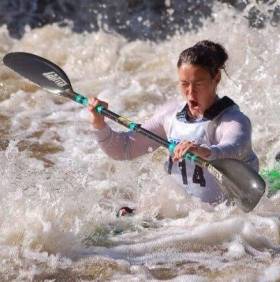Displaying items by tag: Olympic Qualifier
Puspure Qualifies Ireland Single Scull For Olympic Games
#Rowing: Sanita Puspure qualified a third Ireland boat for the Olympic Games today. The 34-year-old single sculler took the second of four Rio places at the Olympic Qualification Regatta in Lucerne. Emma Twigg had her expected win in the event, and Puspure held fifth through 500 metres and half way. However, by the three-quarter mark the Ireland sculler was third behind Twigg and Fie Udby Erichsen, and she moved into second by the finish. Ekaterina Karsten took the third qualification place and Erichsen the final one.
Olympic Qualification Regatta, Lucerne, Switzerland (Irish interest; selected results)
Women
Single Sculls – Final (First Four Qualify for Olympic Games): 1 New Zealand (E Twigg) 7:21.87, 2 Ireland (S Puspure) 7:24.76, 3 Belarus (E Karsten) 7:25.94, 4 Denmark (F Erichsen) 7:26.47; 5 Ukraine 7:28.61, 6 Latvia 7:43.84.
Puspure Books Place in Olympic Qualification Final
#Rowing: Sanita Puspure has qualified for the final of the Olympic Qualification Regatta in Lucerne, Switzerland. The Ireland single sculler finished second in the semi-final behind Emma Twigg of New Zealand, with Elza Gulbe of Latvia taking the third qualification place. Twigg and Puspure were clear in the first and second places from early on, with Gulbe making third her own in the second half, well clear of the other three contenders, from Russia, Spain and Norway.
Denmark’s Fie-Udby Erichsen of Denmark won the second semi-final, with Ekaterina Karsten of Belarus and Nataliya Dovgodko of Ukraine taking the other final places.
The first four scullers in tomorrow’s final will book their places at the Olympic Games.
Olympic Qualification Regatta, Lucerne, Switzerland (Irish interest; selected results)
Women
Single Sculls – Semi-Finals (Three to A Final) – Semi-Final One: 1 New Zealand (E Twigg) 7:36.75, 2 Ireland (S Puspure) 7:40.46, 3 Latvia (E Gulbe) 7:46.69. Semi-Final Two: 1 Denmark (F Erichsen) 7:37.09, 2 Belarus (E Karsten) 7:41.89, 3 Ukraine (N Dovgodko) 7:42.18
Puspure Wins Heat at Olympic Qualification Regatta
#Rowing: Sanita Puspure won her heat at the Olympic Qualification Regatta in Lucerne this morning and qualified directly for the semi-finals. Three places were available, but the Ireland single sculler took the lead early, and never relinquished it, though under pressure from double Olympic champion Ekaterina Karsten, who finished second. Nataliya Dovgodko of the Ukraine took third.
There is one extra place available for women’s single scullers at the qualifier as an invitation place set aside for delegations from small countries has not been taken up. Four will now qualify.
Olympic Qualification Regatta, Lucerne, Switzerland (Irish interest; selected results) – Day One:
Women
Single Sculls – Heat One (First Three to A/B Semi-Final; rest to Repechage): 1 Ireland (S Puspure) 7:38.55, 2 Belarus (E Karsten) 7:40.08, 3 Ukraine (N Dovgodko) 7:48.35; 4 Serbia 8:01.63, 5 Italy 8:03.08.
Heat Two: 1 Denmark (F Erichsen) 7:35.43, 2 Latvia (E Gulbe) 7:41.72, 3 Germany (J Richter) 7:42.23.
Heat Three: 1 New Zealand (E Twigg) 7:31.10, 2 Britain (M Hodgkins-Byrne) 7:39.01, 3 Russia (J Levina) 7:42.64.
Egan Seventh in Second Olympic Qualifier Final
#Canoeing: Jenny Egan finished seventh in her K1 200m final at the canoe sprint European Olympic Qualifier in Duisburg in Germany today. Germany and Sweden secured the top two spots, and with them places at the Olympic Games in Rio de Janeiro. Egan was in the middle of the group from third to ninth who were covered by less than a second. The Irishwoman was competing in her second final of the day.
Tom Brennan finished ninth in his final of the K1 200, with the top two of Spain and Hungary qualifying for Rio de Janeiro.
Canoe Sprint European Olympic Qualifier, Duisburg, Germany (Selected Results, Irish interest)
Men
K1 1,000 – Final: 1 Hungary (B Dombvári) 3 min 35.307, 2 Russia (R Anoshkin) 3:35.695; 4 M Fitzsimon 3:38.727.
K1 200 – Final: 1 Spain (S Craviotto) 34.615, 2 Hungary (Be Horváth) 35.077; 9 T Brennan 36.773.
Women
K1 500 – Final: 1 Germany (S Hering) 1 min 55.378, 2 Slovakia (M Kohlová) 1:55.677; 8 J Egan 2:00.270.
K1 200 – Final: 1 Germany (S Volz) 41.470, 2 Sweden (L Stensils) 41.509; 7 J Egan 42.874.
Paracanoe World Championships, Duisburg
Men - KL3 200 – B Final (Places 10-18): 1 P O’Leary 42.882 seconds.
Egan's First Olympic Qualification Bid Comes Up Short
#Canoeing: Jenny Egan finished eighth in the final of the K1 500 at the canoe sprint European Olympic Qualifier at Duisburg this morning, outside the places which would have qualified her for a place at the Olympic Games in Rio de Janeiro in this class. She has also qualified for the K1 200 final, which takes place later in the day.
Canoe Sprint European Olympic Qualifier, Duisburg, Germany (Selected Results, Irish interest)
Women
K1 500 – Final: 1 Germany (S Hering) 1 min 55.378, 2 Slovakia (M Kohlová) 1:55.677; 8 J Egan 2:00.270.
Ireland Reach Four Finals at Olympic Qualifier
#Canoeing: Ireland brought their tally of finals reached to four at the canoe sprint European Olympic Qualifier in Duisburg today. Jenny Egan made her way to a second final – the K1 200 – and Tom Brennan for the men’s equivalent in the afternoon session. They will qualify for Rio if they finish in the top two in their finals.
Canoe Sprint European Olympic Qualifier, Duisburg, Germany (Selected Results, Irish interest)
Men
K1 1,000 – Heat One (Winner to A Final; 2-7 to semi-final; rest out): 4 M Fitzsimon 3:31.693. Semi-Final: 1 Fitzsimon 3:31.453.
K1 200 – Heat Two (Winner to Final; 2-7 to semi-final; rest out): 4 T Brennan 35.85. Semi-Final (Three to Final; rest out): 3 Brennan 35.938.
K2 200 – Heat One (First Three to A Final; 4-7 to semi-final): 6 T Brennan, B Watkins 34.350. Semi-Final (First Three to A Final; rest out): 5 Brennan, Watkins 34.249.
Women
K1 500 – Heat One (Three to Final; 4-7 to Semi-Final): 5 J Egan 1:55.428. Semi-Final (Three to A Final): 3 Egan 1:52.823.
K1 200 – Heat One (Three to Final; 4-7 to Semi-Final): 3 J Egan 41.515.
Paracanoe World Championships, Duisburg
Men - KL3 200- Heat Four (First Seven to Semi-Final): 2 P O’Leary 42.061. Semi-Final One (First Two and next best time to A Final; 3rd, 4th to B Final): 3 O’Leary 41.722.
Jenny Egan in A Final at Olympic Qualifiers
#Canoeing: Jenny Egan qualified for the A Final of her top event, the K1 500 metres, at the canoe sprint European Olympic Qualifier in Duisburg in Germany today. She finished third in her semi-final. A top-two place in the final would qualify her for the Olympic Games in Rio de Janeiro.
Canoe Sprint European Olympic Qualifier, Duisburg, Germany (Selected Results, Irish interest)
Men
K1 1,000 – Heat One (Winner to A Final; 2-7 to semi-final; rest out): 4 M Fitzsimon 3:31.693.
K2 200 – Heat One (First Three to A Final; 4-7 to semi-final): 6 T Brennan, B Watkins 34.350.
Women
K1 500 – Heat One (Three to Final; 4-7 to Semi-Final): 5 J Egan 1:55.428. Semi-Final (Three to A Final): 3 Egan 1:52.823.
Paracanoe World Championships, Duisburg
Men - KL3 200- Heat Four (First Seven to Semi-Final): 2 P O’Leary 42.061. Semi-Final One (First Two and next best time to A Final; 3rd, 4th to B Final): 3 O’Leary 41.722.

































































